The Secret Knitter, prompted by an article in The Guardian, asks: Is knitting a rebellious activity?
The knitting revolution seems to be hitting the point where the media is doing stories with one of two themes: (1) The knitting revolution is over; (2) Did you know there's a knitting revolution?
The Guardian piece falls into theme #2. Knitting as public art; knitting as a youthful pastime; knitting as a post-feminist reclamation of domestic arts -- all make their appearance in the piece.
On the other hand, NPR's Marketplace recently aired a story conforming to theme #1. Seems that some local yarn stores that opened a few years ago in Davis, California to cater to the new hordes of knitters were closing -- victims of the decline in knitting in general, or of the move to online suppliers (the piece offers both explanations, which is a bit contradictory).
Admittedly I'm immersed in the knitting world -- not in real life, but online -- and so I'm befuddled by both themes. I interact with plenty of those rebel knitters, but nevertheless the majority of the folks on Ravelry are my age or older, with a large contingent of grandmas who've been knitting for decades. And contradicting predictions of the knitting boom's imminent demise, I see online shops sell out of coveted yarn in minutes thanks to electronic passing of information. Many online retailers are internet extensions of brick-and-morter local yarn stores, and so they don't fall into the dichotomy set up by the Marketplace report. They're offering more product all the time, and are having a harder time keeping it in stock.
I argued a few months back that Ravelry, the hundreds-of-thousands-strong online knitting and crocheting community, is a perfect example of the way virtual tools and networking can strengthen real-world phenomena -- creating markets and stimulating the production of new physical realities. Now I'm one of the two leaders of the Ravelympics, a project to see how many finished objects can be completed within the span of the 17 days of the Beijing games. According to a still-incomplete count, 3012 people have signed up to create 7202 knitted and crocheted items.
When I think of all the sweaters, scarves, afghans, premie hats, chemo caps, prayer shawls, mittens, lace, stuffed toys, lingerie, socks, bags, and who knows what else, that will suddenly enter the world during these two and a half weeks, conjured out of cyberspace and abetted by thousands of enthusiastic joiners and cheerleaders and team organizers, I see a force that has the potential to be truly revolutionary. It rejects throwaway consumerist culture in favor of creating something to be used and repaired and handed down and given to those in need. And it is at the same time independent of the limitations of real-world community, which requires proximity and synchrony, and gives birth to real-world community.
So while I'm not out there pumping a fistful of knitting needles into the air or taking a sledgehammer to mechanized looms like some crafting Luddite, there's an aura of rebellion around the knitting that I and my fellow Ravelers do. We're not the front lines, but we're fighting the good fight -- and we're probably the coziest revolutionaries around.
Thursday, July 31, 2008
Wednesday, July 30, 2008
Me, the deleted scenes
I've just started reading Margaret Sartor's Miss American Pie, which largely consists of excerpts from her diaries starting at age 13 in 1972. It's fascinating and addictive, like salted peanuts. Sartor's entries are usually brief -- just a couple of sentences. She begins, at least, writing only for herself. The diary is a terse record of whether she rode her horse that day, and whether she feels good or bad. As she develops an interest in the opposite sex, and simultaneously (not coincidentally) has a religious experience in a charismatic youth group, the entries become more self-conscious, and sometimes quite lengthy.
In her introduction, Sartor talks about rediscovering her diaries right as she was about to turn 43. Her willingness -- her compulsion, really -- to read them appeared all of a sudden, as middle age was taking her away permanently from that person she had been.
Now, I happen to be about to turn 43 myself. And I happen to have a long-unopened box of teenage diaries in my attic. They begin in 1977, when I enter eighth grade and am assigned the task of keeping a journal by my English teacher, Mrs. Goode. And they continue religiously through my high school years, then more sporadically in college. Like Sartor, I have hauled these journals from dorm to apartment to house, through every move, without ever wanting to open them up.
And Sartor's book doesn't make me want to crack the seal on that teenage me, either. Far from it. Unlike her, my entries were long, pretentious and performative from the very start. I imagined myself writing for posterity, and I massaged my middle-class life into the breathless drama I thought it ought to be. Instead of confiding my doubts and fears in the pages of those notebooks, I pretended to be more religious than I was, more romantically victimized than I was, more rebellious and worldly than I was, more saintly and philosophical than I was. These stances frequently came into conflict, but I don't think it ever occurred to me to just try to tell the truth. Posterity -- whoever they were -- wouldn't have been interested.
Frankly, those diaries terrify me. I don't want to be confronted with my teenage self-deception. I fully expect to be mortified by my naivete combined with my insufferable moralism. Just when I've gotten something of a handle on writing well -- with some honesty, the most I can muster -- why would I want to undermine it by reviewing the long history of my failure?
I think it will be a great day when I can get those books down and find the courage to open them up. Although I know there will be entries I'll be too embarrassed -- or too concerned about others' feelings -- to make public, I'd like to post some of them. Maybe I can annotate them or have a conversation with them.
Right now, though, such a public airing of my unformed teenage self seems utterly impossible; the diaries' threat to my current self-image, believe it or not, is too strong. Although perhaps by admitting that very weakness, the ridiculous notion that I could be threatened by those youthful experiments, I can exorcise its power over me.
Perhaps.
In her introduction, Sartor talks about rediscovering her diaries right as she was about to turn 43. Her willingness -- her compulsion, really -- to read them appeared all of a sudden, as middle age was taking her away permanently from that person she had been.
Now, I happen to be about to turn 43 myself. And I happen to have a long-unopened box of teenage diaries in my attic. They begin in 1977, when I enter eighth grade and am assigned the task of keeping a journal by my English teacher, Mrs. Goode. And they continue religiously through my high school years, then more sporadically in college. Like Sartor, I have hauled these journals from dorm to apartment to house, through every move, without ever wanting to open them up.
And Sartor's book doesn't make me want to crack the seal on that teenage me, either. Far from it. Unlike her, my entries were long, pretentious and performative from the very start. I imagined myself writing for posterity, and I massaged my middle-class life into the breathless drama I thought it ought to be. Instead of confiding my doubts and fears in the pages of those notebooks, I pretended to be more religious than I was, more romantically victimized than I was, more rebellious and worldly than I was, more saintly and philosophical than I was. These stances frequently came into conflict, but I don't think it ever occurred to me to just try to tell the truth. Posterity -- whoever they were -- wouldn't have been interested.
Frankly, those diaries terrify me. I don't want to be confronted with my teenage self-deception. I fully expect to be mortified by my naivete combined with my insufferable moralism. Just when I've gotten something of a handle on writing well -- with some honesty, the most I can muster -- why would I want to undermine it by reviewing the long history of my failure?
I think it will be a great day when I can get those books down and find the courage to open them up. Although I know there will be entries I'll be too embarrassed -- or too concerned about others' feelings -- to make public, I'd like to post some of them. Maybe I can annotate them or have a conversation with them.
Right now, though, such a public airing of my unformed teenage self seems utterly impossible; the diaries' threat to my current self-image, believe it or not, is too strong. Although perhaps by admitting that very weakness, the ridiculous notion that I could be threatened by those youthful experiments, I can exorcise its power over me.
Perhaps.
Tuesday, July 29, 2008
"I can spell all the words in town!"
Goaded on by her brother's academic prowess, Cady Gray has been eagerly touting the addition, subtraction, and spelling facts that she knows. Here's a list of words she spelled for me today, four weeks shy of her fourth birthday:
house
water
dress
raindrop
hair
pillow
pants
shirt
bubble
but not: soap. (She tried s-o-u, got uncertain, and then asked for another word. When I tried to tell her the right spelling for soap , she cut me off: "I'll just learn that in school when I go to first grade.")
house
water
dress
raindrop
hair
pillow
pants
shirt
bubble
but not: soap. (She tried s-o-u, got uncertain, and then asked for another word. When I tried to tell her the right spelling for soap , she cut me off: "I'll just learn that in school when I go to first grade.")
Monday, July 28, 2008
Panel by panel
Eric asks for some ideas about comics to check out. His basic parameters: burned out on the most prominent superheroes, interested in alternative stuff, likes insider digs at geek culture, maybe not susceptible to the more audacious Alan Moore aesthetic.
Few of my suggestions are going to come as any surprise to those who've been following comics closely for the last decade. But here are some of my favorites for the one-time fan who's ready to dive back into the pool:
Chris Ware, Jimmy Corrigan, The Smartest Kid On Earth. Nothing in Eric's list of likes and dislikes really tells me whether he'll respond to Ware's architectural, nostalgic, melancholy sensibility. However, Ware is probably my favorite living cartoonist, and a genuine bona-fide certified dyed-in-the-wool genius -- one of those once-in-a-generation near-freaks. Nothing like starting at the top!
Kurt Busiek, Astro City. Even if you think you don't want any more superheroes, Busiek's bright, grounded reimagination of the genre has an invigorating spirit. Of all the superfolk-through-the-eyes-of-ordinary-folk experiments, this may be the most thoroughly entertaining and moving.
Dan Clowes, Caricature. "Caricature" is a story that rewards almost endless scrutiny, and Clowes' famous misanthropy perhaps reaches its artistic zenith in this collection -- just on the edge of disintegrating into postmodernism.
Craig Thompson, Blankets. Marrying the standard bittersweetness-of-adolescence autobiographical trope to outstanding draftsmanship and a deeply-felt religious angle, this massive graphic novel is compulsively readable.
Michel Rebagliati, Paul Has A Summer Job. Or any of the "Paul" books, beautiful and highly artistic pieces of storytelling with themes that sneak up on you -- about the awkward interlude between adulthood and real responsibility.
Guy Delisle, Pyongyang: A Journey In North Korea. A stunning travelogue by a gifted observer who spends time in the mysterious dictatorship supervising outsourced animators.
Rick Geary, The Fatal Bullet. Or any of his "Treasury of Victorian Murder" series (now shifting into the twentieth century with the upcoming volume on the Lindbergh baby). Geary's talents as an illustrator meet his perfect capacity for representing a romanticized past with a jaundiced eye, devoid of sentimentality, in this dissection of the assassination of President Garfield.
Frank King, Walt And Skeezix. Simply the most sublime experience reading comics I've had in the last five years. Nothing less than a celebration of life and humanity in the back alleys of the Roaring Twenties' gentler rural incarnation.
Few of my suggestions are going to come as any surprise to those who've been following comics closely for the last decade. But here are some of my favorites for the one-time fan who's ready to dive back into the pool:
Chris Ware, Jimmy Corrigan, The Smartest Kid On Earth. Nothing in Eric's list of likes and dislikes really tells me whether he'll respond to Ware's architectural, nostalgic, melancholy sensibility. However, Ware is probably my favorite living cartoonist, and a genuine bona-fide certified dyed-in-the-wool genius -- one of those once-in-a-generation near-freaks. Nothing like starting at the top!
Kurt Busiek, Astro City. Even if you think you don't want any more superheroes, Busiek's bright, grounded reimagination of the genre has an invigorating spirit. Of all the superfolk-through-the-eyes-of-ordinary-folk experiments, this may be the most thoroughly entertaining and moving.
Dan Clowes, Caricature. "Caricature" is a story that rewards almost endless scrutiny, and Clowes' famous misanthropy perhaps reaches its artistic zenith in this collection -- just on the edge of disintegrating into postmodernism.
Craig Thompson, Blankets. Marrying the standard bittersweetness-of-adolescence autobiographical trope to outstanding draftsmanship and a deeply-felt religious angle, this massive graphic novel is compulsively readable.
Michel Rebagliati, Paul Has A Summer Job. Or any of the "Paul" books, beautiful and highly artistic pieces of storytelling with themes that sneak up on you -- about the awkward interlude between adulthood and real responsibility.
Guy Delisle, Pyongyang: A Journey In North Korea. A stunning travelogue by a gifted observer who spends time in the mysterious dictatorship supervising outsourced animators.
Rick Geary, The Fatal Bullet. Or any of his "Treasury of Victorian Murder" series (now shifting into the twentieth century with the upcoming volume on the Lindbergh baby). Geary's talents as an illustrator meet his perfect capacity for representing a romanticized past with a jaundiced eye, devoid of sentimentality, in this dissection of the assassination of President Garfield.
Frank King, Walt And Skeezix. Simply the most sublime experience reading comics I've had in the last five years. Nothing less than a celebration of life and humanity in the back alleys of the Roaring Twenties' gentler rural incarnation.
Sunday, July 27, 2008
And the dish ran away with the spoon
Today's post, about colorful hats and plastic beads, is at Toxophily. Meanwhile, Noel and I are going out for dinner and perhaps a post-prandial stroll through the picturesque downtown area if the heat index drops below 100. Enjoy your evening!
Saturday, July 26, 2008
A new golden age
Thanks to TiVo (I love you TiVo), we're watching more television than ever before -- but we're also watching better television than ever before. And lately it seems that there is too much good television to watch. Cable series like The Closer and Burn Notice have jumped the gun on the traditional fall season, and the justly-acclaimed Mad Men begins its second season tomorrow. Before long The Shield will open the curtain on its final season in about a month.
The struggle to fit all these entertaining and often masterful dramas into our viewing schedule caused me to have another crazy idea about popular culture's relationship to television in 2008. Have there ever been more outlets for scripted television? With basic cable channels like USA, TBS, FX, AMC -- heck, even ABC Family (we're enjoying The Middleman) -- filling their schedules with original series, creative types have more executives than ever to whom to pitch their series ideas. That's not to mention pay-cable stalwarts like HBO and Showtime, which have been airing original dramas in increasing numbers for more than a decade.
And the networks seems inclined to embrace shows that are unusual, edgy, or need time to build an audience. If I were a writer with an idea for a serialized story, I'd be thanking my lucky stars to be alive and working at the present moment.
The struggle to fit all these entertaining and often masterful dramas into our viewing schedule caused me to have another crazy idea about popular culture's relationship to television in 2008. Have there ever been more outlets for scripted television? With basic cable channels like USA, TBS, FX, AMC -- heck, even ABC Family (we're enjoying The Middleman) -- filling their schedules with original series, creative types have more executives than ever to whom to pitch their series ideas. That's not to mention pay-cable stalwarts like HBO and Showtime, which have been airing original dramas in increasing numbers for more than a decade.
And the networks seems inclined to embrace shows that are unusual, edgy, or need time to build an audience. If I were a writer with an idea for a serialized story, I'd be thanking my lucky stars to be alive and working at the present moment.
Friday, July 25, 2008
Renaissance
Noel and I are dedicated reality show connoisseurs -- and, truth be told, gourmands. We like a classy, well-staged reality competition, but there's also room on our TiVo for the guiltier pleasures.
This season we started watching Fox's So You Think You Can Dance again, after abandoning it in its first season. And while one might think that it tends toward the cheesier side of the spectrum, I've been surprised at how much I appreciate what the show tries to do -- and what it actually accomplishes. Nigel Lythgoe, quadrillionaire producer of American Idol, is an old hoofer from way back. And what he's done here is basically create a show that celebrates a form of entertainment he personally loves. The whole enterprise has a distinctly personal, labor of love feel. And while it hits the traditional Idol marks -- America voting dancers off the island, half-crazed judges screeching catch phrases -- don't you have to also give it credit for persuading viewers to watch foxtrots and Viennese waltzes even without the presence of B-list celebrities? Ballroom and modern dancing (liberally mixed with poppier forms like hip hop, disco, and Broadway) executed by actual trained artists, even professionals ... when's the last time that counted as Nielsen-busting entertainment on American television?
As I watched dancers from the Alvin Ailey company and the Los Angeles ballet on the So You Think You Can Dance results shows recently, I wondered whether anyone has noticed that these shows have turned back the clock in an interesting way. Haute cuisine, haute couture, classical dance -- thanks to reality competitions, these elite worlds are getting some serious popular exposure on television. Back in the golden age of television, variety shows freely mixed high culture and low; opera stars and classical pianists shared Ed Sullivan's stage with plate spinners and ventriloquists. Sure, the representatives of rarefied art forms that deigned to come on television risked being called popularizers, sullying the purity of their artistry by association with the vaudeville world of the vast wasteland. And that's still true today for the respected chefs, designers, choreographers and the like who appear on reality competitions.
But the stigma seems to have passed a tipping point. The best chefs in the world regularly serve as judges on Top Chef, for example. They seem to have accepted that shows like these can educate viewers about fine dining, without lowering standards or being crippled by commercialism. One determining factor in this acceptance is the presence of respected colleagues in the shows production team (Tom Collichio, Michael Kors, Mia Michaels, etc.).
Even though reality competitions have now been around for more than a decade, they're still pooh-poohed by many as evidence for the irreversible decline of television. Their role in exposing viewers to areas of culture and expertise far removed from mass culture is less appreciated -- but perhaps it shouldn't be ignored.
This season we started watching Fox's So You Think You Can Dance again, after abandoning it in its first season. And while one might think that it tends toward the cheesier side of the spectrum, I've been surprised at how much I appreciate what the show tries to do -- and what it actually accomplishes. Nigel Lythgoe, quadrillionaire producer of American Idol, is an old hoofer from way back. And what he's done here is basically create a show that celebrates a form of entertainment he personally loves. The whole enterprise has a distinctly personal, labor of love feel. And while it hits the traditional Idol marks -- America voting dancers off the island, half-crazed judges screeching catch phrases -- don't you have to also give it credit for persuading viewers to watch foxtrots and Viennese waltzes even without the presence of B-list celebrities? Ballroom and modern dancing (liberally mixed with poppier forms like hip hop, disco, and Broadway) executed by actual trained artists, even professionals ... when's the last time that counted as Nielsen-busting entertainment on American television?
As I watched dancers from the Alvin Ailey company and the Los Angeles ballet on the So You Think You Can Dance results shows recently, I wondered whether anyone has noticed that these shows have turned back the clock in an interesting way. Haute cuisine, haute couture, classical dance -- thanks to reality competitions, these elite worlds are getting some serious popular exposure on television. Back in the golden age of television, variety shows freely mixed high culture and low; opera stars and classical pianists shared Ed Sullivan's stage with plate spinners and ventriloquists. Sure, the representatives of rarefied art forms that deigned to come on television risked being called popularizers, sullying the purity of their artistry by association with the vaudeville world of the vast wasteland. And that's still true today for the respected chefs, designers, choreographers and the like who appear on reality competitions.
But the stigma seems to have passed a tipping point. The best chefs in the world regularly serve as judges on Top Chef, for example. They seem to have accepted that shows like these can educate viewers about fine dining, without lowering standards or being crippled by commercialism. One determining factor in this acceptance is the presence of respected colleagues in the shows production team (Tom Collichio, Michael Kors, Mia Michaels, etc.).
Even though reality competitions have now been around for more than a decade, they're still pooh-poohed by many as evidence for the irreversible decline of television. Their role in exposing viewers to areas of culture and expertise far removed from mass culture is less appreciated -- but perhaps it shouldn't be ignored.
Thursday, July 24, 2008
Breaking all the rules
A friend and mentor asked me about blogging today. Why do I do it? What do I write about? He's been writing all his life, and is looking for a way to share what he does with the many people who are interested in his wisdom.
I wish I were in his position. For all the years I've known him, he's been sharing thought-provoking bits of philosophy, personal existential reflection, and commentary on current events with his colleagues. He's got a storehouse of ideas and experiences that he could dole out daily for many, many years.
It's only occasionally that I feel like I have something to say through this medium. But then, I didn't start blogging because I had anything to say. If I'm being honest, I started blogging because I wanted to record what my children were doing, and what I thought about it. I knew I wouldn't have the discipline to keep a personal journal -- but maybe if some other people were out there reading and waiting for the next post, I'd be motivated to continue.
My intentions changed when I started blogging daily almost two years ago. I got hooked on the insight about writing -- composing, thinking, constructing, editing -- that blogging every day during NaBloPoMo '06 provided me. If I learned this much about my writing process and my writer's voice from blogging for 30 days, how much would I learn if I kept going?
So my blogging is more about process than content. I do it because writing in this blog teaches me something about myself. I don't do it because I think I'm writing well, or because I think I have a perspective that will enrich other's lives. If I thought that, I doubt I'd continue blogging daily, because I don't write well daily, and it's only on rare occasions that I believe I've gotten at something important or worth saying. I still want to record what's going on with my children as they grow up; I was never good at saving mementos or taking enough pictures or video. But I don't want to write about that every day, either. The only reason to write every day is because writing every day is a worthwhile thing for me to do.
That means it's doubly and triply kind of all of you to stop by. I don't intend to give you anything through this blog; it's not for you, ultimately, nor do I believe there's that much I have to give. So you readers are a gift to me that I have no way to repay.
If you blog ... why do you do it? If you don't ... why not?
I wish I were in his position. For all the years I've known him, he's been sharing thought-provoking bits of philosophy, personal existential reflection, and commentary on current events with his colleagues. He's got a storehouse of ideas and experiences that he could dole out daily for many, many years.
It's only occasionally that I feel like I have something to say through this medium. But then, I didn't start blogging because I had anything to say. If I'm being honest, I started blogging because I wanted to record what my children were doing, and what I thought about it. I knew I wouldn't have the discipline to keep a personal journal -- but maybe if some other people were out there reading and waiting for the next post, I'd be motivated to continue.
My intentions changed when I started blogging daily almost two years ago. I got hooked on the insight about writing -- composing, thinking, constructing, editing -- that blogging every day during NaBloPoMo '06 provided me. If I learned this much about my writing process and my writer's voice from blogging for 30 days, how much would I learn if I kept going?
So my blogging is more about process than content. I do it because writing in this blog teaches me something about myself. I don't do it because I think I'm writing well, or because I think I have a perspective that will enrich other's lives. If I thought that, I doubt I'd continue blogging daily, because I don't write well daily, and it's only on rare occasions that I believe I've gotten at something important or worth saying. I still want to record what's going on with my children as they grow up; I was never good at saving mementos or taking enough pictures or video. But I don't want to write about that every day, either. The only reason to write every day is because writing every day is a worthwhile thing for me to do.
That means it's doubly and triply kind of all of you to stop by. I don't intend to give you anything through this blog; it's not for you, ultimately, nor do I believe there's that much I have to give. So you readers are a gift to me that I have no way to repay.
If you blog ... why do you do it? If you don't ... why not?
Wednesday, July 23, 2008
We're not worthy
Ever mindful of the struggle to find daily blog fodder, Whit kindly left a question in her comment to yesterday's post:
And truth be told, most of us critics got a big chunk of our film education, at least early on, from the Oscars. Like any well-publicized award, the winners and nominations form a list that interested amateurs to can use as an entryway into the appreciation of that art. Sure, the Oscars are hopelessly "middlebrow"; there's a certain type of drama that the Academy seems not to be able to restrain itself from praising. Stories about physical affliction, serious (but not too dark or twisted) tales of violence, biopics, sobering portraits of war, stately historical melodramas, adaptations of lauded literary works. At the same time, comedies that are not artful enough, dramas that are too experimental, and most genre work (science fiction, horror, rom-coms, even animation) have a hard time breaking through to be considered for Oscars. Anybody who stops with the Academy Award lists is going to get a very narrow view of the cinematic art.
But nobody's ever claimed that the Oscars are the be-all and end-all of movie quality. Best they be considered a starting point -- and in fact, they don't make all that bad of one, like most lists and awards. Supplement them with Danny Peary's thought-provoking book Alternate Oscars, in which the indispensable writer on cult topics critiques each year's choices, and you're on your way. All you have to do then is follow the rabbit trails -- the other movies that appear on critics' lists, for example, from various genres or periods; the acclaimed directors, writers, and cinematographers whose body of work is honored by various organizations or canonized by critics; and so on. Pretty soon you're on your way to a solid grounding in at least the better-known areas of English-language film, and you probably know where to look to find out more.
The Oscars' limitations derive from the nature of the awards themselves -- self-congratulatory. Industry people giving awards to other industry people isn't exactly a recipe for objectivity. In fact, it inevitably leads to the kind of narrowness I just described. Industry people are naturally going to promote (and reinforce with awards) work that reflects what they believe the industry should be -- in this case, for many years, films that are socially relevant and serious without being unprofitable.
So saying what is "Oscar worthy" is a bit of a circular exercise. We might mean it as shorthand for "of the highest quality; laudable." But in fact, there's absolutely an Oscar-style performance: charismatic actors getting grubby and hiding their star quality under makeup or antiheroics or tragic underdoggery.
I don't think anybody who's keeping track of Oscar possibles at this stage has downgraded Ledger for being dead. (If anything, dying -- young or old -- causes your award stock to go way up.) And for actors, it's usually not a demerit to have a showy turn in genre fare. The acting awards range far wider than the awards for films themselves. And while the Academy hasn't been falling all over itself to give prizes to the recent spate of comic-book adaptations, that's not really because it turn up its nose at low culture -- it's more because the majority of the films haven't been all that good.
But we could be reaching a turning point with The Dark Knight and the upcoming Watchmen. Like the pulp novels that once provided the basis for The Godfather and its ilk, the superhero source material clearly can be turned into rich, relevant film art. The very best talent is being attracted to the genre, and it's being used as a vehicle for themes and commentary and character development. Of course none of this is new -- genre work has always had this potential and often this reality. But it often takes a visionary auteur's embrace of the form to get it into the mainstream of the cultural conversation pit. It's possible that the universal (and well-deserved) praise afforded to Nolan's work will mean that the movie itself breaks out of the technical-awards ghetto that most summer blockbusters occupy at the Academy Awards. I don't think there's any doubt that Ledger's remarkable performance will be in the mix for awards at the end of the year -- in contention if not nominated. The question for me is whether he will be plucked out of the movie's context to be considered solo, as the actors so often are, or whether he'll be part of a more broad spectrum of appreciation for The Dark Knight. I have great hope for the latter.
What is your definition of an Oscar worthy performance? There's a lot of debate going on now around Ledger's performance in The Dark Knight. I think people say he doesn't deserve it because a) he's no longer living, and b)he starred in a comic book movie. Those to me don't have any bearing on the fact that it was a great performance.Critics get asked about the Oscars a lot. Some profess to be completely weary of the subject, and refuse to engage in the yearly speculation and prognostication. Others recognize that the Oscars, although far from an independent evaluation of quality, are a media event that the public uses as a guide to the world of worthwhile film. Critics ignore the Oscars at their peril; far more people respond to Oscar nods when looking for a good movie to see or rent -- or just when trying to enter the general cultural conversation about movies -- than follow critics' top ten lists or (heaven forbid) read their reviews.
And truth be told, most of us critics got a big chunk of our film education, at least early on, from the Oscars. Like any well-publicized award, the winners and nominations form a list that interested amateurs to can use as an entryway into the appreciation of that art. Sure, the Oscars are hopelessly "middlebrow"; there's a certain type of drama that the Academy seems not to be able to restrain itself from praising. Stories about physical affliction, serious (but not too dark or twisted) tales of violence, biopics, sobering portraits of war, stately historical melodramas, adaptations of lauded literary works. At the same time, comedies that are not artful enough, dramas that are too experimental, and most genre work (science fiction, horror, rom-coms, even animation) have a hard time breaking through to be considered for Oscars. Anybody who stops with the Academy Award lists is going to get a very narrow view of the cinematic art.
But nobody's ever claimed that the Oscars are the be-all and end-all of movie quality. Best they be considered a starting point -- and in fact, they don't make all that bad of one, like most lists and awards. Supplement them with Danny Peary's thought-provoking book Alternate Oscars, in which the indispensable writer on cult topics critiques each year's choices, and you're on your way. All you have to do then is follow the rabbit trails -- the other movies that appear on critics' lists, for example, from various genres or periods; the acclaimed directors, writers, and cinematographers whose body of work is honored by various organizations or canonized by critics; and so on. Pretty soon you're on your way to a solid grounding in at least the better-known areas of English-language film, and you probably know where to look to find out more.
The Oscars' limitations derive from the nature of the awards themselves -- self-congratulatory. Industry people giving awards to other industry people isn't exactly a recipe for objectivity. In fact, it inevitably leads to the kind of narrowness I just described. Industry people are naturally going to promote (and reinforce with awards) work that reflects what they believe the industry should be -- in this case, for many years, films that are socially relevant and serious without being unprofitable.
So saying what is "Oscar worthy" is a bit of a circular exercise. We might mean it as shorthand for "of the highest quality; laudable." But in fact, there's absolutely an Oscar-style performance: charismatic actors getting grubby and hiding their star quality under makeup or antiheroics or tragic underdoggery.
I don't think anybody who's keeping track of Oscar possibles at this stage has downgraded Ledger for being dead. (If anything, dying -- young or old -- causes your award stock to go way up.) And for actors, it's usually not a demerit to have a showy turn in genre fare. The acting awards range far wider than the awards for films themselves. And while the Academy hasn't been falling all over itself to give prizes to the recent spate of comic-book adaptations, that's not really because it turn up its nose at low culture -- it's more because the majority of the films haven't been all that good.
But we could be reaching a turning point with The Dark Knight and the upcoming Watchmen. Like the pulp novels that once provided the basis for The Godfather and its ilk, the superhero source material clearly can be turned into rich, relevant film art. The very best talent is being attracted to the genre, and it's being used as a vehicle for themes and commentary and character development. Of course none of this is new -- genre work has always had this potential and often this reality. But it often takes a visionary auteur's embrace of the form to get it into the mainstream of the cultural conversation pit. It's possible that the universal (and well-deserved) praise afforded to Nolan's work will mean that the movie itself breaks out of the technical-awards ghetto that most summer blockbusters occupy at the Academy Awards. I don't think there's any doubt that Ledger's remarkable performance will be in the mix for awards at the end of the year -- in contention if not nominated. The question for me is whether he will be plucked out of the movie's context to be considered solo, as the actors so often are, or whether he'll be part of a more broad spectrum of appreciation for The Dark Knight. I have great hope for the latter.
Tuesday, July 22, 2008
Load letter paper
Archer has discovered the word processor on the computer he uses to play web games and CD-ROMs. I remember when word processing -- especially with laser printers -- first became available to me in college. It was such a thrill to produce documents that looked professionally printed.
I have a sneaking suspicion that Archer feels that same excitement. He's using his newly acquired ability to create documents to replicate the printed matter he finds most compelling: sales receipts.

It appears that he's also fascinated by Google results, although he hasn't entirely grasped what they mean.

I have a sneaking suspicion that Archer feels that same excitement. He's using his newly acquired ability to create documents to replicate the printed matter he finds most compelling: sales receipts.

It appears that he's also fascinated by Google results, although he hasn't entirely grasped what they mean.

Monday, July 21, 2008
Secret messages
Every week I read Noel's Popless column for his insights and his eloquent prose. But I also read it to see what he's said about me and the kids -- to catch a glimpse of the life we live with him, filtered through the read-by-millions website and reflected back to me through all those eyes.
I appear in Popless -- and in Noel's occasional other posts on the A.V. blog -- in two ways. Sometimes I'm referenced directly, usually as "my wife" although sometimes by name. And sometimes I appear in a ghostly way, unseen by readers other than close friends and family, in the music Noel writes about -- music that I particularly love, music that he might not have chosen to highlight were in not for the fact that I would miss its absence.
Noel's written about Archer's autism before (and probably will again), and he sometimes can't resist a cute Cady Gray story. More often, the kids are set dressing for the world he's weaving with words, a way to remind the readers that he's not a teenager anymore and that parenthood has changed the way he relates to media past and present.
When I run across a reference to the kids in Noel's work, I feel a glow of pride. (I also feel a bit superior for knowing how wonderful and beautiful they are, in a way that the A.V. Club readers never will.) When I find myself in something he's written, I feel a flush, a prickle, as if everybody's looking at me. That's odd, because most of the time when Noel writes "my wife," people don't know it's me -- fellow A.V. Club writer. I'm the anonymous woman behind the phrase, a label into which readers can either pour a brief, indulgent bit of imagination (what's she like?) or, more likely, blip over without any thought or hesitation, the way Linus does with Russian names in Dostoevsky.
Every so often a commenter stumbles onto the knowledge that these two writers with different names are linked. I was amused by a vanity Google alert which informed me that somebody had blogged about that fact a few weeks back. If my media experience is any indication, that kind of contextual, real-world information is a bit intrusive for readers. We'd like to imagine that writers live in some Cloud-Cuckoo-Land from which they produce their work, unhindered by relationships except to the extent that such figures provide color or dramatic foils or a sense of humanity. But maybe in the new media age, when bloggers can become the axes around which communities gather and revolve, readers are more interested in writers as people -- in their lives, their minds, their struggles, their tastes, their opinions.
I know there are a couple of commenters who regularly visit the A.V. Club site who know Noel and me in real life, and I can tell by their comments that they feel pride in that -- as if they have an inside track in the little group who collect around our work online. It's almost like having fans. And being on the inside in Noel's life, the one that he writes about for thousands of unknown eyes, makes me feel like a superfan.
I appear in Popless -- and in Noel's occasional other posts on the A.V. blog -- in two ways. Sometimes I'm referenced directly, usually as "my wife" although sometimes by name. And sometimes I appear in a ghostly way, unseen by readers other than close friends and family, in the music Noel writes about -- music that I particularly love, music that he might not have chosen to highlight were in not for the fact that I would miss its absence.
Noel's written about Archer's autism before (and probably will again), and he sometimes can't resist a cute Cady Gray story. More often, the kids are set dressing for the world he's weaving with words, a way to remind the readers that he's not a teenager anymore and that parenthood has changed the way he relates to media past and present.
When I run across a reference to the kids in Noel's work, I feel a glow of pride. (I also feel a bit superior for knowing how wonderful and beautiful they are, in a way that the A.V. Club readers never will.) When I find myself in something he's written, I feel a flush, a prickle, as if everybody's looking at me. That's odd, because most of the time when Noel writes "my wife," people don't know it's me -- fellow A.V. Club writer. I'm the anonymous woman behind the phrase, a label into which readers can either pour a brief, indulgent bit of imagination (what's she like?) or, more likely, blip over without any thought or hesitation, the way Linus does with Russian names in Dostoevsky.
Every so often a commenter stumbles onto the knowledge that these two writers with different names are linked. I was amused by a vanity Google alert which informed me that somebody had blogged about that fact a few weeks back. If my media experience is any indication, that kind of contextual, real-world information is a bit intrusive for readers. We'd like to imagine that writers live in some Cloud-Cuckoo-Land from which they produce their work, unhindered by relationships except to the extent that such figures provide color or dramatic foils or a sense of humanity. But maybe in the new media age, when bloggers can become the axes around which communities gather and revolve, readers are more interested in writers as people -- in their lives, their minds, their struggles, their tastes, their opinions.
I know there are a couple of commenters who regularly visit the A.V. Club site who know Noel and me in real life, and I can tell by their comments that they feel pride in that -- as if they have an inside track in the little group who collect around our work online. It's almost like having fans. And being on the inside in Noel's life, the one that he writes about for thousands of unknown eyes, makes me feel like a superfan.
Sunday, July 20, 2008
New experiences
As the summer winds down, so does the time available to try new things. Archer is going to language camp for the next two weeks here on my campus -- Spanish next week, and French the week after that. Both the kids now have hand-me-down two-wheelers with training wheels, thanks to Freecycle, and they are working hard to master them.
I'll be trying something next in three weeks -- Fair Isle knitting, also known as stranded colorwork. This is the kind of knitting that produces beautiful, colorful small-scale designs like those associated with Norwegian sweaters. I'm starting out small, with these super-popular fingerless mittens.
What are you doing this summer that you've never done before?
I'll be trying something next in three weeks -- Fair Isle knitting, also known as stranded colorwork. This is the kind of knitting that produces beautiful, colorful small-scale designs like those associated with Norwegian sweaters. I'm starting out small, with these super-popular fingerless mittens.
What are you doing this summer that you've never done before?
Saturday, July 19, 2008
Beyond heroism
Today's post, about draping the rainbow around Cady Gray's neck, is at Toxophily.
We went to see The Dark Knight tonight. If I need to present Kierkegaard 101 to students in two and a half hours, I think I'll just show them this movie.
We went to see The Dark Knight tonight. If I need to present Kierkegaard 101 to students in two and a half hours, I think I'll just show them this movie.
Friday, July 18, 2008
Cars of my life, Part II: A car of one's own
Click here for Part I.

1988 Chevy Beretta. My parents bought my older brother a car (a 1984 Toyota Celica, I believe) when he graduated from college, and they continued the tradition with me. I remember test driving several cars before we settled on this little manual-transmission 5-speed. The silver paint job began to flake off the roof a few years later, and I found out that there was a recall on lots of GM cars with silver paint from that era. The car made it through one fairly significant wreck (a sun-in-your-eyes rear-ending in Athens that I'll not soon forget), and served me well for 12 years, making the journey from Chattanooga to Athens to Charlottesville and finally to Conway. It was retired in 2001 when I was seven months pregnant with Archer; we drove it to Little Rock one last time and traded it in for ...

2000 Subaru Outback. This car was a one-year-old demo car when we bought it, and it's still going strong eight years later. With our no-commute lifestyle, we don't put the miles on very fast. I think we're up to about 70,000 miles now. I really love this car, and I love my mechanic (Skip's Foreign Car Repair) even more. Which reminds me, I need to get the brakes serviced -- I'm sure our neighbors are tired of the squealing.
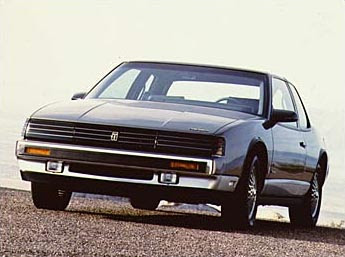
1989 Oldsmobile Toranado Trofeo. Noel bought this car used in Virginia in 1998 or thereabouts. The sale was brokered by one of our co-workers at GE Fanuc who was always wheeling and dealing several jalopies. We brought it here to Conway and used it as our emergency second car. After some kind of accident that I have blocked from my memory, the insurance labeled it totaled, and we basically stopped renewing the registration. We sold it to a couple of guys who were doing some work on the house and expressed interest. They apparently never filed for a title or registered it, because when it got seized in some kind of crime investigation about a year ago, we got notified by the police as if it still belonged to us.

2005 Honda Civic Hybrid. Remember how all the talk about hybrid cars was just starting up in 2004-2005? I had seen a couple of early models when they were brought on campus as part of an environmental sustainability week we were sponsoring. When we knew we needed a real second car to replace the unreliable junker we'd been using as our backup, I decided on a hybrid. At the time it was about greenhouse gas emissions. Now when I'm getting 35 mpg tooling around town in stop-and-go traffic, I feel like a real smart cookie.

1988 Chevy Beretta. My parents bought my older brother a car (a 1984 Toyota Celica, I believe) when he graduated from college, and they continued the tradition with me. I remember test driving several cars before we settled on this little manual-transmission 5-speed. The silver paint job began to flake off the roof a few years later, and I found out that there was a recall on lots of GM cars with silver paint from that era. The car made it through one fairly significant wreck (a sun-in-your-eyes rear-ending in Athens that I'll not soon forget), and served me well for 12 years, making the journey from Chattanooga to Athens to Charlottesville and finally to Conway. It was retired in 2001 when I was seven months pregnant with Archer; we drove it to Little Rock one last time and traded it in for ...

2000 Subaru Outback. This car was a one-year-old demo car when we bought it, and it's still going strong eight years later. With our no-commute lifestyle, we don't put the miles on very fast. I think we're up to about 70,000 miles now. I really love this car, and I love my mechanic (Skip's Foreign Car Repair) even more. Which reminds me, I need to get the brakes serviced -- I'm sure our neighbors are tired of the squealing.

1989 Oldsmobile Toranado Trofeo. Noel bought this car used in Virginia in 1998 or thereabouts. The sale was brokered by one of our co-workers at GE Fanuc who was always wheeling and dealing several jalopies. We brought it here to Conway and used it as our emergency second car. After some kind of accident that I have blocked from my memory, the insurance labeled it totaled, and we basically stopped renewing the registration. We sold it to a couple of guys who were doing some work on the house and expressed interest. They apparently never filed for a title or registered it, because when it got seized in some kind of crime investigation about a year ago, we got notified by the police as if it still belonged to us.

2005 Honda Civic Hybrid. Remember how all the talk about hybrid cars was just starting up in 2004-2005? I had seen a couple of early models when they were brought on campus as part of an environmental sustainability week we were sponsoring. When we knew we needed a real second car to replace the unreliable junker we'd been using as our backup, I decided on a hybrid. At the time it was about greenhouse gas emissions. Now when I'm getting 35 mpg tooling around town in stop-and-go traffic, I feel like a real smart cookie.
Thursday, July 17, 2008
Cars of my life, Part I: My unglamorous youth
We all travel through our years in a succession of vehicles ... the ones our parents and siblings drove, the ones we drive, the ones we get for our kids (except for my kids, who due to peak oil and fortunately for my stress levels will come of age after personal automobiles are all but extinct). Here are the ones I remember best.
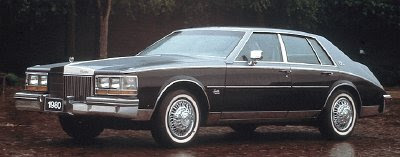
1980 Cadillac Seville. My mom drove Cadillacs ever since I can remember. This was one of the strangest. Remember that high, sloping trunk design that looked like somebody had sheered off the back end of the car with a giant rotating saw? It also featured little feedback LEDs on the right and left corners of the front end, which were supposed to tell you what lights were on (headlights, parking lights, turn signals). I still have a soft spot for the retro technology of the Cadillac -- wood grain instead of metal, plenty of knobs and dials, an embrace of digital readouts that seemed half-hearted at best -- they were always surrounded or even undercut by analog inputs and outputs. Whenever I hear "Looks Like We Made It" I think of the sample 8-track that came with the car, which had two Barry Manilow songs on it.
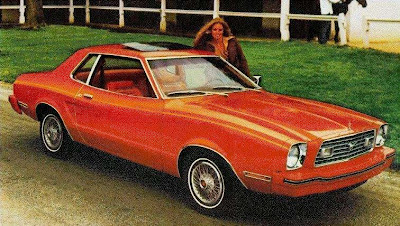
1978 Mustang II. This was my older brother's car for a few years. I grabbed every chance I could to ride in it so I could hear actual rock and roll coming out of the 8-track tape deck. It had an automatic transmission, but the shiny chrome shifter was between the front seats. I thought this car was completely badass. Whenever I hear ELO's Out of the Blue, I think about riding home from Sunday night services in the passenger seat of this car -- half an hour of swirling, Beatlesque pop cranked up to levels our parents wouldn't have tolerated.

1975 Volkswagen Beetle. I learned to drive a stick in this car, out on the deserted country roads around our Apison, Tennessee home. I think Dad picked it up cheap just to teach us in. He loved to talk about the legends surrounding the car -- that if you drove it into a lake it would float; that you could fix the engine with rubber bands. It felt more like driving a toy than an actual vehicle, which is great for learning --the stakes seem so low. I believe it only had an AM radio.
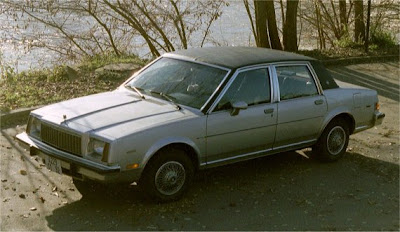
1981 Buick Skylark. My parents let me use this car during my senior year in high school. It was that boxy K-car look -- about as unsexy as cars got. But it was a measure of freedom, until I got stuck in the middle of a three-car pileup on I-24 East just before the East Brainerd Road exit. The car was totaled. No cassette deck, so I listened to KZ106 exclusively in this car; I believe Kansas was playing when I had the wreck.

1984 Honda Prelude. My dad traded in his usual Audis and Mercedes for this sporty number when I was just about ready to leave home. It was red and zippy and vaguely triangular and low to the ground and had the sunroof and the headlights that swiveled up out of the front end. I loved that car. Still to this day, I think I crave that car. It's everything I thought a sports car should be.

1978 International Harvester Scout II. ... But whenever I came home from college, this is what I drove. It was brown with a white hard top when we got it as the third or fourth owner. I swung in too close to the row of mailboxes at the end of our driveway on my way home one day and took off the passenger side mirror. When the radio cut out or dissolved into short-circuity static, it could be fixed most of the time by vigorous flathanded thumps on the dashboard. I think it was my younger brother rather than me who sideswiped some of those yellow concrete poles set up to protect gas pumps and suck, leaving a set of yellow scrapes down the passenger side that made it look as though the Scout had survived a run-in with a school bus. After my carless years were over and I was out on my own, my folks had it painted flat blue and my younger brother continued driving it. Lap belt only, and a suspension like our Kubota tractor -- you bounced all the way around town. Mom and Dad swear that the person they sold it to still uses it, and although I don't see how we'd get confirmation, it's a believable tale; the proto-SUV was indestructible. Even after Doug's collision with a city bus in the Brainerd Road tunnel, the Scout abides.
Note: All errors of dates and attribution of vehicular damage are my personal responsibility, and I'm sure they will be corrected quickly by my siblings.
Tomorrow! Part II: A car of one's own.

1980 Cadillac Seville. My mom drove Cadillacs ever since I can remember. This was one of the strangest. Remember that high, sloping trunk design that looked like somebody had sheered off the back end of the car with a giant rotating saw? It also featured little feedback LEDs on the right and left corners of the front end, which were supposed to tell you what lights were on (headlights, parking lights, turn signals). I still have a soft spot for the retro technology of the Cadillac -- wood grain instead of metal, plenty of knobs and dials, an embrace of digital readouts that seemed half-hearted at best -- they were always surrounded or even undercut by analog inputs and outputs. Whenever I hear "Looks Like We Made It" I think of the sample 8-track that came with the car, which had two Barry Manilow songs on it.

1978 Mustang II. This was my older brother's car for a few years. I grabbed every chance I could to ride in it so I could hear actual rock and roll coming out of the 8-track tape deck. It had an automatic transmission, but the shiny chrome shifter was between the front seats. I thought this car was completely badass. Whenever I hear ELO's Out of the Blue, I think about riding home from Sunday night services in the passenger seat of this car -- half an hour of swirling, Beatlesque pop cranked up to levels our parents wouldn't have tolerated.

1975 Volkswagen Beetle. I learned to drive a stick in this car, out on the deserted country roads around our Apison, Tennessee home. I think Dad picked it up cheap just to teach us in. He loved to talk about the legends surrounding the car -- that if you drove it into a lake it would float; that you could fix the engine with rubber bands. It felt more like driving a toy than an actual vehicle, which is great for learning --the stakes seem so low. I believe it only had an AM radio.

1981 Buick Skylark. My parents let me use this car during my senior year in high school. It was that boxy K-car look -- about as unsexy as cars got. But it was a measure of freedom, until I got stuck in the middle of a three-car pileup on I-24 East just before the East Brainerd Road exit. The car was totaled. No cassette deck, so I listened to KZ106 exclusively in this car; I believe Kansas was playing when I had the wreck.

1984 Honda Prelude. My dad traded in his usual Audis and Mercedes for this sporty number when I was just about ready to leave home. It was red and zippy and vaguely triangular and low to the ground and had the sunroof and the headlights that swiveled up out of the front end. I loved that car. Still to this day, I think I crave that car. It's everything I thought a sports car should be.

1978 International Harvester Scout II. ... But whenever I came home from college, this is what I drove. It was brown with a white hard top when we got it as the third or fourth owner. I swung in too close to the row of mailboxes at the end of our driveway on my way home one day and took off the passenger side mirror. When the radio cut out or dissolved into short-circuity static, it could be fixed most of the time by vigorous flathanded thumps on the dashboard. I think it was my younger brother rather than me who sideswiped some of those yellow concrete poles set up to protect gas pumps and suck, leaving a set of yellow scrapes down the passenger side that made it look as though the Scout had survived a run-in with a school bus. After my carless years were over and I was out on my own, my folks had it painted flat blue and my younger brother continued driving it. Lap belt only, and a suspension like our Kubota tractor -- you bounced all the way around town. Mom and Dad swear that the person they sold it to still uses it, and although I don't see how we'd get confirmation, it's a believable tale; the proto-SUV was indestructible. Even after Doug's collision with a city bus in the Brainerd Road tunnel, the Scout abides.
Note: All errors of dates and attribution of vehicular damage are my personal responsibility, and I'm sure they will be corrected quickly by my siblings.
Tomorrow! Part II: A car of one's own.
Wednesday, July 16, 2008
Buy me something
Last night Archer came out of his bedroom about twenty minutes before lights out. "Um, tomorrow we can buy me something to measure corners," he said.
"What do you need to measure, big man?" I asked.
"I just need to measure some right angles," he said. "And I can make angles with my hands."
"Where did you see these angles you need to measure? Was it in a workbook?"
"Yeah, in my workbook. We can just go buy me one tomorrow," he asserted hopefully.
Some kids are constantly demanding special food, special toys, special whatever. Archer asks for protractors.
"What do you need to measure, big man?" I asked.
"I just need to measure some right angles," he said. "And I can make angles with my hands."
"Where did you see these angles you need to measure? Was it in a workbook?"
"Yeah, in my workbook. We can just go buy me one tomorrow," he asserted hopefully.
Some kids are constantly demanding special food, special toys, special whatever. Archer asks for protractors.
Tuesday, July 15, 2008
Castles in the sky
Our lieutenant governor, elected in 2006, made the inauguration of a state lottery the centerpiece of his campaign. Now that he's in office, he's spearheaded a petition drive that will put a constitutional amendment on this year's ballot -- Arkansas has a constitutional prohibition against gambling (with exceptions for the Oaklawn racetrack and West Memphis dog track, and a recently-crafted one for charitable bingo).
Evangelical forces have always been able to block lottery proposals in the past, but it looks like their ability to mobilize against it on the grounds of personal morality have been crippled by the economy, continuing news about education in decline, and the belief that millions of Arkansas dollars are flowing into border states with lotteries.
I was heartened today, however, to see that the United Methodist Church in the state announced its opposition to the lottery -- not because gambling is a sin, but because (a) it's socially irresponsible and (b) it doesn't deliver on its promises.
My own opposition to state-run lotteries was solidified while I was living in Virginia and read an illuminating newspaper series about the disappointments of its lottery. Here are the dirty secrets:
Lotteries are not mysterious, untried enterprises. There is ample data. Yet most of the debate rests on appeals to common sense, hope, and fear (people are going to play anyway -- they should spend their money at home; we can give scholarships to everybody; without lottery money our education system will inevitably fail). When nobody's talking about the facts, you can bet that the facts aren't on the side of public opinion -- the one thing nobody wants to be against.
Evangelical forces have always been able to block lottery proposals in the past, but it looks like their ability to mobilize against it on the grounds of personal morality have been crippled by the economy, continuing news about education in decline, and the belief that millions of Arkansas dollars are flowing into border states with lotteries.
I was heartened today, however, to see that the United Methodist Church in the state announced its opposition to the lottery -- not because gambling is a sin, but because (a) it's socially irresponsible and (b) it doesn't deliver on its promises.
My own opposition to state-run lotteries was solidified while I was living in Virginia and read an illuminating newspaper series about the disappointments of its lottery. Here are the dirty secrets:
- Lotteries earn impressive profits when they are new, but the revenue plateaus after a few years. The only way to goad the public into buying more tickets (to meet the projections of ever-growing revenue on which budgets have already been based) is to raise the payouts and introduce new games. Soon the enormous jackpots start eating away at the cash that's supposed to be flowing into the state coffers. Once it's joined a multi-lottery coalition, like Powerball, the state has just about run out of ways to finance the outrageous jackpots that motivate players to spend more. Georgia's lottery, always touted as the success story on which other states model their pitches of scholarships for all, forever, cut its scholarships several years ago and proposed tightening eligibility requirements for them because of declining reserves.
- In order to get people to play, the state must advertise. Those who live in states with lotteries are inured to the constant promotion of the games in all media; it's a fact of life. Yet the state thereby becomes a gambling promoter, hustling as hard as it can to get people to ante up. My moral objection to the lottery is that the state should not be hawking snake oil. Sure, I know that the state isn't always on the up and up with its citizens. But a program that puts the government in the position of a carnival barker, desperate to fleece as many people out of as much cash as possible just to make its nut, is demeaning at best and close to fraudulent at worst.
- And of course, it's been well known for decades who plays the lottery -- poor people. Maryland's lottery is funded at a rate of 3 to 1 by people with incomes below the poverty line. Just ten percent of the players produce 50% of the revenue. You can argue about voluntary taxation all you want, but combine the state promotion of effortless wealth with a group of people in desperate need of said wealth, and who exactly were we expecting to play?
Lotteries are not mysterious, untried enterprises. There is ample data. Yet most of the debate rests on appeals to common sense, hope, and fear (people are going to play anyway -- they should spend their money at home; we can give scholarships to everybody; without lottery money our education system will inevitably fail). When nobody's talking about the facts, you can bet that the facts aren't on the side of public opinion -- the one thing nobody wants to be against.
Monday, July 14, 2008
Raise your hand before answering
Today's post, about the simple things in life (and in the bathroom), is at Toxophily.
Here I'll give you the last chapter of the painting-the-desks saga (read part one here):

Once the sun came out again, I painted the bottom of the chairs. Easy enough, although requiring lots of wiping off the metal with a rag soaked with mineral spirits, since masking all of it was impossible. I didn't obsess over it.

After the paint dried, it was time for the kids to try them out! Here's Cady Gray in her blue version ...

... and Archer in red.
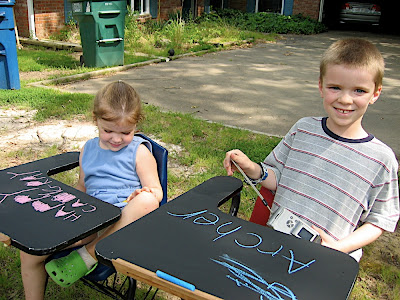
Success!
Here I'll give you the last chapter of the painting-the-desks saga (read part one here):
Once the sun came out again, I painted the bottom of the chairs. Easy enough, although requiring lots of wiping off the metal with a rag soaked with mineral spirits, since masking all of it was impossible. I didn't obsess over it.
After the paint dried, it was time for the kids to try them out! Here's Cady Gray in her blue version ...
... and Archer in red.
Success!
Sunday, July 13, 2008
Blame Google
Today's Arkansas Democrat-Gazette reprinted this scattershot story from the Chicago Tribune and headlined it "Is the internet making us duh-mer?"
The underlying question is this: Does increased accessibility of information result in a shallower knowledge base among the populace? Well, of course it does. It's a completely rational choice: Why spend time and effort placing information in your brain's long-term memory, when the long-term random-access memory of the internet already holds it?
The real question is why this rational behavior has resulted in a generation that (to paraphrase all the alarmist stories from the last ten years) can't find China on a map with both hands and a GPS-enabled 3G China-Locator 240Z (tm). And to my mind, the answer is that education has been very slow to evolve in the new information-rich, information-accessible environment. We have a lumbering brontosaurus of a primary and secondary education system that still stresses putting bits of information in students' heads for recall, instead of teaching them critical thinking, connected thinking, and problem solving to use the information they have at their fingertips.
Now I think there is a set of general, broad pictures that everyone ought to place in their personal memory banks in order to put the detailed information available on the internet in instant context. They should know what continent France is on, in what century Europeans discovered the Americas, and in what decades the Vietnam War happened. The closer to the students' own time and place we get, the more detail should appear on that general, broad map; we should have a richer context for the last twenty years in America than we need for the last 500 years in Europe.
By all accounts students are not getting this general, broad picture that will help them use the informational nuggets it's so easy to find online. One could argue that the internet is generally making them lazy, or that it's rotting their brains, or whatever you like. But isn't it also plausible that (once again) the education system isn't helping them distinguish between the framework they need in their heads and the content that hangs on that framework? Which side of the knowledge equation are the tests testing and the teach-to-the-test classes teaching?
Just like you can do more math if you let a calculator do the calculating, concentrating on understanding relationships and developing solution strategies, you can get more education if you let the internet do your storage and retrieval. But we won't see the benefit until the inherently conservative educational system -- and I include everything from primary through graduate school therein -- stands up to the traditionalists (for whom only bits in the memory bank count as knowledge) and stumbles into the nineteen-nineties.
The underlying question is this: Does increased accessibility of information result in a shallower knowledge base among the populace? Well, of course it does. It's a completely rational choice: Why spend time and effort placing information in your brain's long-term memory, when the long-term random-access memory of the internet already holds it?
The real question is why this rational behavior has resulted in a generation that (to paraphrase all the alarmist stories from the last ten years) can't find China on a map with both hands and a GPS-enabled 3G China-Locator 240Z (tm). And to my mind, the answer is that education has been very slow to evolve in the new information-rich, information-accessible environment. We have a lumbering brontosaurus of a primary and secondary education system that still stresses putting bits of information in students' heads for recall, instead of teaching them critical thinking, connected thinking, and problem solving to use the information they have at their fingertips.
Now I think there is a set of general, broad pictures that everyone ought to place in their personal memory banks in order to put the detailed information available on the internet in instant context. They should know what continent France is on, in what century Europeans discovered the Americas, and in what decades the Vietnam War happened. The closer to the students' own time and place we get, the more detail should appear on that general, broad map; we should have a richer context for the last twenty years in America than we need for the last 500 years in Europe.
By all accounts students are not getting this general, broad picture that will help them use the informational nuggets it's so easy to find online. One could argue that the internet is generally making them lazy, or that it's rotting their brains, or whatever you like. But isn't it also plausible that (once again) the education system isn't helping them distinguish between the framework they need in their heads and the content that hangs on that framework? Which side of the knowledge equation are the tests testing and the teach-to-the-test classes teaching?
Just like you can do more math if you let a calculator do the calculating, concentrating on understanding relationships and developing solution strategies, you can get more education if you let the internet do your storage and retrieval. But we won't see the benefit until the inherently conservative educational system -- and I include everything from primary through graduate school therein -- stands up to the traditionalists (for whom only bits in the memory bank count as knowledge) and stumbles into the nineteen-nineties.
Saturday, July 12, 2008
Gee whiskers
The inspirationally gigantic Complete Little Orphan Annie, Volume 1 is sitting on our bedside table, and Noel and I have both made it through the first three story arcs, digesting them in marathon edge-of-our-seats sessions spanning several months of the strip at a time. Although it's hardly as gentle or character-driven (not to mention as gag-filled and fantastical) as my beloved Gasoline Alley, it shares a remarkably clear and unpretentious style.
What's amazing about these artifacts from eighty years ago is how easy it is to get caught up in Annie's drama. Annie is a boondocks saint, an orphan who is alternately misunderstood and exploited by adults, a hard-case street urchin who prefers to stick up for everyone else rather than herself. And yet her story, so melodramatic in outline (snooty rich lady hates kids but flaunts her "charity" work with Annie; middle-class shopkeeper takes Annie in to help in her shop six days a week and returns her to the "home" on Sundays to save feeding her; beleaguered farmers love her like a daughter but are on the verge of losing her along with their land), is presented almost documentary-style. Drawn at the height of the silent film era, almost none of the close-ups, exaggerations, and flowery tropes of the cinema make it into Harold Gray's panels.
There's a ethical treatise in Gray's worldview. Good-hearted people can be found in any class -- working, middle, even war profiteers. The pure of heart can recognize each other intuitively, but if they are inexperienced in the ways of the world, they tend to believe the best of all the louts and mercenaries and criminals and scam artists that surround them, clinging to their illusions until they've been fleeced. What's needed are street-smart individuals with hearts of gold, who have no problem socking the baddies in the jaw and giving a hand to the poor unfortunates who need it most. Annie does her part at ground level, but she's at the mercy of an adult society that sees her as a problem and not an asset. Daddy Warbucks is much more powerful, with his money and his willingness to brawl with lowlifes who don't understand reason -- but he's at the mercy of the business world that gives him the money. He's always disappearing for months at a time to attend to overseas munitions interests, during which Annie tries to hang on to three squares and stay ahead of the dogcatcher.
The parts of society that wouldn't become visible in most media until the Great Depression -- debt-riddled landowners, tramps and hobos, homeless waifs -- are already at the center of Gray's strips in the mid-1920's. It's a fascinating sociological artifact. But more than that, it's a cracking story with frequently lyrical writing and effortless emotional pull. I can't wait to dive back in.
What's amazing about these artifacts from eighty years ago is how easy it is to get caught up in Annie's drama. Annie is a boondocks saint, an orphan who is alternately misunderstood and exploited by adults, a hard-case street urchin who prefers to stick up for everyone else rather than herself. And yet her story, so melodramatic in outline (snooty rich lady hates kids but flaunts her "charity" work with Annie; middle-class shopkeeper takes Annie in to help in her shop six days a week and returns her to the "home" on Sundays to save feeding her; beleaguered farmers love her like a daughter but are on the verge of losing her along with their land), is presented almost documentary-style. Drawn at the height of the silent film era, almost none of the close-ups, exaggerations, and flowery tropes of the cinema make it into Harold Gray's panels.
There's a ethical treatise in Gray's worldview. Good-hearted people can be found in any class -- working, middle, even war profiteers. The pure of heart can recognize each other intuitively, but if they are inexperienced in the ways of the world, they tend to believe the best of all the louts and mercenaries and criminals and scam artists that surround them, clinging to their illusions until they've been fleeced. What's needed are street-smart individuals with hearts of gold, who have no problem socking the baddies in the jaw and giving a hand to the poor unfortunates who need it most. Annie does her part at ground level, but she's at the mercy of an adult society that sees her as a problem and not an asset. Daddy Warbucks is much more powerful, with his money and his willingness to brawl with lowlifes who don't understand reason -- but he's at the mercy of the business world that gives him the money. He's always disappearing for months at a time to attend to overseas munitions interests, during which Annie tries to hang on to three squares and stay ahead of the dogcatcher.
The parts of society that wouldn't become visible in most media until the Great Depression -- debt-riddled landowners, tramps and hobos, homeless waifs -- are already at the center of Gray's strips in the mid-1920's. It's a fascinating sociological artifact. But more than that, it's a cracking story with frequently lyrical writing and effortless emotional pull. I can't wait to dive back in.
Friday, July 11, 2008
Defining taste
Last night I watched The Greatest American Dog, the latest CBS reality show clogging up the summer airwaves. It was seriously low fare, all dysfunctional relationships and delusional dog owners, with a few salt-of-the-earth types sprinkled in for salubrious moral contrast.
But even with all its horrors -- Nathan Rabin at the A.V. Club's TV Club gave it an F -- I didn't want to turn my back in disgust. In fact, I asked Noel to record it again next week. When Nathan asked me in the comments to his review why I would watch it again, I wrote:
If you can figure out and articulate what attracts you to crap, then you're a long way toward knowing yourself -- which will help you better understand your relationship to the whole spectrum of quality, as well as avoid being bamboozled by products engineered to your particular brain receptors. It's easy to confuse personal pleasure with the presence of real value in what engendered the pleasure, and it's helpful to know that the effect of enjoyment is not as intimately or directly connected with the cause of quality as we might like to imagine.
But even with all its horrors -- Nathan Rabin at the A.V. Club's TV Club gave it an F -- I didn't want to turn my back in disgust. In fact, I asked Noel to record it again next week. When Nathan asked me in the comments to his review why I would watch it again, I wrote:
Actually, the whole performance thing is going on here, which is part of why I watch so much reality TV. Can you get this creature (which, as the judges point out, really means yourself) to perform under pressure? "Dog" kind of externalizes that whole question, which makes it interesting enough for me to watch. (The contestants' despair over dogs that indicated in rehearsals that they would be unreliable -- that's what fascinates me. What does that say about them -- them more than their dogs?)There's nothing so enlightening about one's own taste than trying to figure out why you enjoy something that lacks quality. Whatever it is that you enjoy there has something to do with what interests you, with what pushes your buttons, with what tickles your pleasure centers. It's not about educated taste, which is the recognition of quality; it's about who you are underneath that education.
If you can figure out and articulate what attracts you to crap, then you're a long way toward knowing yourself -- which will help you better understand your relationship to the whole spectrum of quality, as well as avoid being bamboozled by products engineered to your particular brain receptors. It's easy to confuse personal pleasure with the presence of real value in what engendered the pleasure, and it's helpful to know that the effect of enjoyment is not as intimately or directly connected with the cause of quality as we might like to imagine.
Thursday, July 10, 2008
Reclamation
Over the July 4 weekend, I freecycled two old school desks for the kids and set about rehabilitating them into something a little less institutional.

Here's how they looked before I started painting. Mustard yellow plastic chairs, wood-grain laminate desks.
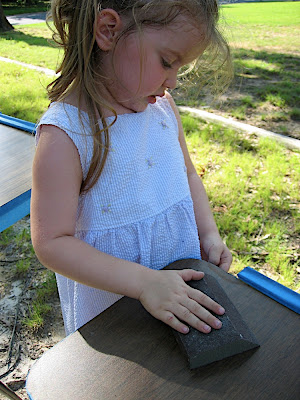

We had to scuff up the coated laminate as much as we could before priming with latex. Even then, it took three coats of primer.
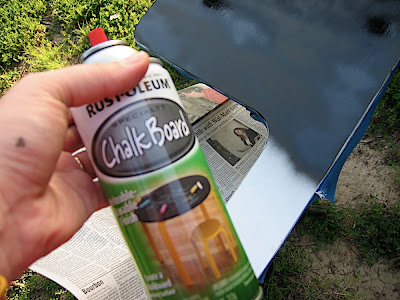
Then I used this spray-on chalkboard paint. The advantage of spray paint is that you can do coats in quick succession, and you get a very even surface.
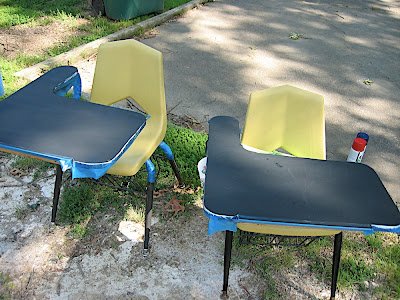
My painting was interrupted by a few days of rain, but today I took advantage of some afternoon sun and some pent-up frustration from work to paint the plastic chairs. I used the Rustoleum version of that Krylon Fusion paint that came out a few years ago.

Check out those bright colors! Really brings that harvest gold into the twenty-first century, doesn't it?

The red one is for Archer ...

and the blue one is for Cady Gray. They picked out the colors themselves on a trip to Home Depot. The selection of colors of plastic paint there wasn't extensive (I thought for a while Cady Gray would have to settle for forest green until we found blue on an endcap). The Krylon might come in more colors, but they don't carry it at the Depot.
I still have to paint the bottoms of the plastic chairs. I'm trying to keep the black metal legs and frame as paint-free as I can, but they're darn hard to mask. Instead I'm just keeping a rag soaked with mineral spirits handy to wipe off the metal after I've put a coat of paint on the plastic.
I'll reveal the finished products as soon as I get another sunny day in the forecast!
Here's how they looked before I started painting. Mustard yellow plastic chairs, wood-grain laminate desks.
We had to scuff up the coated laminate as much as we could before priming with latex. Even then, it took three coats of primer.
Then I used this spray-on chalkboard paint. The advantage of spray paint is that you can do coats in quick succession, and you get a very even surface.
My painting was interrupted by a few days of rain, but today I took advantage of some afternoon sun and some pent-up frustration from work to paint the plastic chairs. I used the Rustoleum version of that Krylon Fusion paint that came out a few years ago.
Check out those bright colors! Really brings that harvest gold into the twenty-first century, doesn't it?
The red one is for Archer ...
and the blue one is for Cady Gray. They picked out the colors themselves on a trip to Home Depot. The selection of colors of plastic paint there wasn't extensive (I thought for a while Cady Gray would have to settle for forest green until we found blue on an endcap). The Krylon might come in more colors, but they don't carry it at the Depot.
I still have to paint the bottoms of the plastic chairs. I'm trying to keep the black metal legs and frame as paint-free as I can, but they're darn hard to mask. Instead I'm just keeping a rag soaked with mineral spirits handy to wipe off the metal after I've put a coat of paint on the plastic.
I'll reveal the finished products as soon as I get another sunny day in the forecast!
Wednesday, July 9, 2008
Should we order a pizza?
I've been head-over-heels in love with Macintosh computers since my older brother worked for Apple, back in the late eighties and early nineties. Actually, it was probably before that -- perhaps the Apple ][s in the computer lab in my eighth-grade hallway, or the Mac Classics in the composing room at the university newspaper.
Dwayne was probably living in Atlanta working for Peachtree Software or the Corbis archive when he showed us the Talking Moose. Anyone who had an early Mac remembers it. The Moose sat in a little window on top of your desktop and made snide remarks at odd intervals. Its robotic, yet oddly emotive voice commented if you didn't do anything (my favorite: "You are getting sleeeeepy ... your eyelids are getting heavier and heavier") or if you did something (the oddly wistful "I wish I had a brain").
All those memories came flooding back when I went to see WALL*E a couple of weeks ago. Wall*E's voice is produced by MacInTalk, the speech synthesis engine that Apple included in the earliest Macs, more than 20 years ago. Listening to it, I couldn't help thinking of the Talking Moose -- his mismatched googly eyes, his amateurish outline, his minimal animation.
You can get the Moose for Mac OS X and for Windows XP now. And you can make him say anything you want. But for all the improvements (color, better mouth animation, more choices and settings), I'll always be nostalgic for that crude line drawing and Steven Hawking-esque approximation of human charm that my brother demonstrated with such delight, showing us that the Mac had personality.
Dwayne was probably living in Atlanta working for Peachtree Software or the Corbis archive when he showed us the Talking Moose. Anyone who had an early Mac remembers it. The Moose sat in a little window on top of your desktop and made snide remarks at odd intervals. Its robotic, yet oddly emotive voice commented if you didn't do anything (my favorite: "You are getting sleeeeepy ... your eyelids are getting heavier and heavier") or if you did something (the oddly wistful "I wish I had a brain").
All those memories came flooding back when I went to see WALL*E a couple of weeks ago. Wall*E's voice is produced by MacInTalk, the speech synthesis engine that Apple included in the earliest Macs, more than 20 years ago. Listening to it, I couldn't help thinking of the Talking Moose -- his mismatched googly eyes, his amateurish outline, his minimal animation.
You can get the Moose for Mac OS X and for Windows XP now. And you can make him say anything you want. But for all the improvements (color, better mouth animation, more choices and settings), I'll always be nostalgic for that crude line drawing and Steven Hawking-esque approximation of human charm that my brother demonstrated with such delight, showing us that the Mac had personality.
Tuesday, July 8, 2008
Culture, secondhand
Whit's answer to Saturday's question about pop culture quotes we use in daily life opens a whole 'nother can of worms. Like most people of her generation -- and maybe most Americans overall -- she identifies the quote "Maybe the dingoes ate your baby" (delivered in an Australian accent) with Seinfeld. But of course the line is a reference to another pop culture product: the movie A Cry In The Dark, in which Meryl Streep blames dingoes for the death of her baby although others suspect she did it herself.
All of us who grew up in the age of mass media get some portion of our cultural literacy secondhand. We know about Wagnerian opera because of What's Opera, Doc?, or about twentieth-century British politics because of punk rock lyrics. Everything I know about the Napoleonic Wars is courtesy of Patrick O'Brian. Noel's familiarity with the works of Thomas Hardy is limited to this Monty Python sketch, but it's enough to provide a few key details.
Every night Noel and I quiz each other with the daily trivia questions in Ken Jennings' addictive Trivia Almanac. And regularly we run across pieces of knowledge about literature or music or art that we know only because it was referenced on television, in movies, or in comic books.
What's your source of secondhand culture, and did it ever save your bacon on a pop quiz?
All of us who grew up in the age of mass media get some portion of our cultural literacy secondhand. We know about Wagnerian opera because of What's Opera, Doc?, or about twentieth-century British politics because of punk rock lyrics. Everything I know about the Napoleonic Wars is courtesy of Patrick O'Brian. Noel's familiarity with the works of Thomas Hardy is limited to this Monty Python sketch, but it's enough to provide a few key details.
Every night Noel and I quiz each other with the daily trivia questions in Ken Jennings' addictive Trivia Almanac. And regularly we run across pieces of knowledge about literature or music or art that we know only because it was referenced on television, in movies, or in comic books.
What's your source of secondhand culture, and did it ever save your bacon on a pop quiz?
Monday, July 7, 2008
Tennis, anyone?
Sunday's epic battle at Wimbledon between Federer and Nadal took me back to my youth. My parents were avid tennis players, and all of us got lessons at Cumberland Youth Foundation, the recreation center to which we belonged. When we moved out of town and built our house in the country, Mom and Dad decided to put a tennis court right in the front yard -- really, instead of a front yard. Morning and night, someone was hitting a few balls; I remember many evenings where we played until we couldn't see the ball anymore.
All the Grand Slam events were must viewing at our house, but especially Wimbledon. The problem was that the men's final took place on Sunday morning, so usually by the time we got home from church we'd only be able to catch the last set or two, if we were lucky. I seem to remember a couple of occasions where we stayed home from church to see the match, but perhaps I'm only channeling my wishes from those days.
When I became interested in professional tennis, the age of Ilie Nastase and Jimmy Conners was just ending, and the age of John McEnroe and Bjorn Borg was arriving. I learned to play with a wooden racket that I kept in a press, and I remember vividly the controversy over the larger composite rackets that were starting to appear on the professional circuit.
The match at this year's Wimbledon brought back memories of a time when pro tennis was at the center of American sports consciousness, when as many people talked about it and followed it as followed pro basketball, for example. Even though we weren't watching, legends were being made and genius was happening on the courts of the world. Sometimes a great rivalry can regenerate interest in a sport; is Federer-Nadal that tipping point to bring tennis back from the well-groomed lawns of the rich into the mainstream of the middle class, as Tiger Woods did for golf?
All the Grand Slam events were must viewing at our house, but especially Wimbledon. The problem was that the men's final took place on Sunday morning, so usually by the time we got home from church we'd only be able to catch the last set or two, if we were lucky. I seem to remember a couple of occasions where we stayed home from church to see the match, but perhaps I'm only channeling my wishes from those days.
When I became interested in professional tennis, the age of Ilie Nastase and Jimmy Conners was just ending, and the age of John McEnroe and Bjorn Borg was arriving. I learned to play with a wooden racket that I kept in a press, and I remember vividly the controversy over the larger composite rackets that were starting to appear on the professional circuit.
The match at this year's Wimbledon brought back memories of a time when pro tennis was at the center of American sports consciousness, when as many people talked about it and followed it as followed pro basketball, for example. Even though we weren't watching, legends were being made and genius was happening on the courts of the world. Sometimes a great rivalry can regenerate interest in a sport; is Federer-Nadal that tipping point to bring tennis back from the well-groomed lawns of the rich into the mainstream of the middle class, as Tiger Woods did for golf?
Sunday, July 6, 2008
The big show
On our way to Home Depot this afternoon to pick up materials for a couple of projects (details later), Archer said that he wanted to write down three songs for a show he would do "on the stage." I gave him a piece of paper on which Cady Gray had drawn a turtle at church this morning, the back of a Chili's receipt, and a cardboard DVD mailer -- the best writing materials I could find in the car. Here's what he wrote (all sic except for the footnotes):
HERE'S YOU
Here^s you, Take a ride, Make a sec, Pick Case 26*, Were Friends! 3x
Here's you, Here's you, This is you! (repeat)
* a "Deal Or No Deal" reference
SAY THANKS**
The one who will give it to you!
Say thanks to them!
(repeat)
**Archer specified that he would say this one, rather than singing it.
DO IT RIGHT AWAY
Do it right away! Make it! Make it! Do it right away! Do it now! Do it right now! (repeat)
(We did indeed get a performance of all three songs outside after dinner, complete with the specified number of repeats, although it wasn't what Archer had in mind -- he wanted to go to his school at 7:00, and I was afraid for a moment that the substitution wouldn't be acceptable.)
HERE'S YOU
Here^s you, Take a ride, Make a sec, Pick Case 26*, Were Friends! 3x
Here's you, Here's you, This is you! (repeat)
* a "Deal Or No Deal" reference
SAY THANKS**
The one who will give it to you!
Say thanks to them!
(repeat)
**Archer specified that he would say this one, rather than singing it.
DO IT RIGHT AWAY
Do it right away! Make it! Make it! Do it right away! Do it now! Do it right now! (repeat)
(We did indeed get a performance of all three songs outside after dinner, complete with the specified number of repeats, although it wasn't what Archer had in mind -- he wanted to go to his school at 7:00, and I was afraid for a moment that the substitution wouldn't be acceptable.)
Saturday, July 5, 2008
Miscellaneous quotations for everyday use
Last week, in my Newsradio blog, I asked commenters to produce a Newsradio version of the famous A.V. Club feature "Simpsons Quotes For Everyday Use." Since then I've become more acutedly attuned to the quotations from various pop culture sources that have become indispensable around our house. Here are just a few from this summer:
Quote: "Eat a nut. Look at view. Eat a nut. Look at view."
Source: Scaredy Squirrel by Melanie Watt
Context: The daily routine of a squirrel who is afraid to leave his tree.
Real-life uses: Description of any monotonous or repetitive process.
Quote: "Directive."
Source: WALL*E
Context: Eve explains to Wall-E why she has collect plants and take them to the captain.
Real-life uses: Whenever you've gotta do what you've gotta do.
Quote: "Great ____, or the greatest _____?"
Source: Stephen Colbert on The Colbert Report
Context: Asking interviewees how history will remember George W. Bush.
Real-life uses: Commentary on anything you hear described by the adjective "great."
Quote: "Whatever, mole."
Source: The Mole
Context: A contestant isn't interested in the explanations of another contestant.
Real-life uses: To dismiss anyone, anytime!
What quotations are frequently employed at your house, and for what purpose?
Quote: "Eat a nut. Look at view. Eat a nut. Look at view."
Source: Scaredy Squirrel by Melanie Watt
Context: The daily routine of a squirrel who is afraid to leave his tree.
Real-life uses: Description of any monotonous or repetitive process.
Quote: "Directive."
Source: WALL*E
Context: Eve explains to Wall-E why she has collect plants and take them to the captain.
Real-life uses: Whenever you've gotta do what you've gotta do.
Quote: "Great ____, or the greatest _____?"
Source: Stephen Colbert on The Colbert Report
Context: Asking interviewees how history will remember George W. Bush.
Real-life uses: Commentary on anything you hear described by the adjective "great."
Quote: "Whatever, mole."
Source: The Mole
Context: A contestant isn't interested in the explanations of another contestant.
Real-life uses: To dismiss anyone, anytime!
What quotations are frequently employed at your house, and for what purpose?
Friday, July 4, 2008
Finishing touches
Today's post, wherein I get to the finish line on a few knitting projects and start a few more, is at Toxophily.
We spent the Fourth celebrating America's freedom to jump on giant inflated pieces of plastic in imaginative shapes. Archer took his camera to chronicle Cady Gray's encounter with inflatable Batman. Remember: If you don't jump, the terrorists win.

We spent the Fourth celebrating America's freedom to jump on giant inflated pieces of plastic in imaginative shapes. Archer took his camera to chronicle Cady Gray's encounter with inflatable Batman. Remember: If you don't jump, the terrorists win.
Thursday, July 3, 2008
The tote board
Halfway through the year. Noel is about to take stock of the first half of his Popless project. I'm trying to pull the cord to start the fall semester lawnmower (it's kinda sticky). Time to make a list of what I've accomplished in 2008. Will it make me feel like I've been busy, and therefore I should rest on my laurels? Or will it make me feel like I've been lazy, and there's no way to salvage the year so I might as well not even try? (Either way, I can take it easy for the next six months!)
- read 20 books
- saw 22 movies
- wrote 15 book reviews
- wrote 18 television reviews
- had 4 academic publications
- wrote 4 encyclopedia entries
- completed 10 knitted items (3 pairs of gloves, 2 pairs of socks, 2 hats, 1 sweater, 2 miscellaneous)
Wednesday, July 2, 2008
Call it morning driving through the sound
Almost a year ago, I wrote about the Conway street department's embrace of roundabouts as a tool for traffic management at problematic intersections. At that point the second roundabout in the city, only a mile or so from our house, had just opened.
It was with great excitement earlier this year that we saw the signs of a roundabout coming at the four-way stop right at the entrance to our neighborhood. Painted lines appeared on the street designating crosswalks. The corners of the intersection were shaved off and curved curbs put in where the cars would enter and exit the circle. Several weeks ago, segments of the circle at the middle -- the ones that wouldn't block the straight-through roads still operating -- were completed.
Today, in a flurry of all-at-once activity, the city took the plunge. They blocked off the crossing roads, filled in the circle, set up yield signs and marked off the medians that will insistently urge traffic to flow to the right.
And now ... we have our very own roundabout!

Cars are going around instead of through!

Brand-new signs remind the drivers what to do!
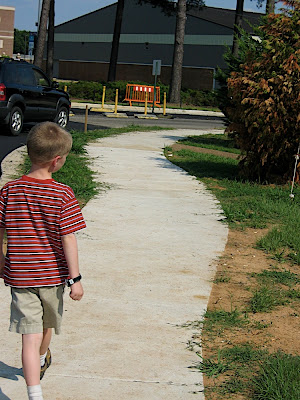
There's a new sidewalk to lead students from the apartments down the street toward the campus just on the other side of the roundabout.

The wheelchair grip-bumps for the sidewalk curb cut-outs are so new, they haven't had the plastic taken off yet.

No time to pour concrete medians yet -- these temporary barriers will do for now.

Orange fences stand in for the parts of the red circle that will become permanent later. Yesterday, cars were driving over the spaces now blocked off by those fences.

A roundabout is a thing of love.
It was with great excitement earlier this year that we saw the signs of a roundabout coming at the four-way stop right at the entrance to our neighborhood. Painted lines appeared on the street designating crosswalks. The corners of the intersection were shaved off and curved curbs put in where the cars would enter and exit the circle. Several weeks ago, segments of the circle at the middle -- the ones that wouldn't block the straight-through roads still operating -- were completed.
Today, in a flurry of all-at-once activity, the city took the plunge. They blocked off the crossing roads, filled in the circle, set up yield signs and marked off the medians that will insistently urge traffic to flow to the right.
And now ... we have our very own roundabout!
Cars are going around instead of through!
Brand-new signs remind the drivers what to do!
There's a new sidewalk to lead students from the apartments down the street toward the campus just on the other side of the roundabout.
The wheelchair grip-bumps for the sidewalk curb cut-outs are so new, they haven't had the plastic taken off yet.
No time to pour concrete medians yet -- these temporary barriers will do for now.
Orange fences stand in for the parts of the red circle that will become permanent later. Yesterday, cars were driving over the spaces now blocked off by those fences.
A roundabout is a thing of love.
Tuesday, July 1, 2008
Dance party
One of my favorite pastimes is watching Cady Gray dance. She twists her palms like she's doing the King Tut, bobs her head, and twirls in kind of a hippy-dippy fashion. And I can make her dance at the drop of a hat -- by dancing myself, by saying "move and groove," or by just rocking my head back and forth to the radio.
I'd really like to see her tackle some of the steps you can make Mo Willem's characters Elephant and Piggie do on this page. Check it out -- if you pick the dances in the right order, you can make them do power combo moves!
I'd really like to see her tackle some of the steps you can make Mo Willem's characters Elephant and Piggie do on this page. Check it out -- if you pick the dances in the right order, you can make them do power combo moves!
Subscribe to:
Comments (Atom)




